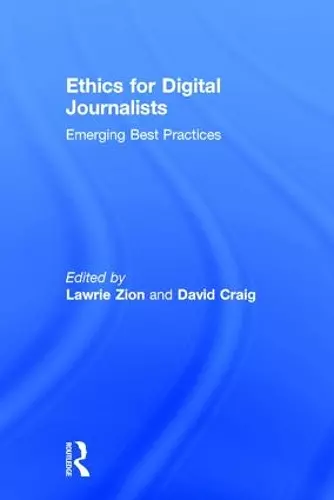Ethics for Digital Journalists
Emerging Best Practices
David Craig editor Lawrie Zion editor
Format:Hardback
Publisher:Taylor & Francis Ltd
Published:18th Sep '14
Currently unavailable, and unfortunately no date known when it will be back
This hardback is available in another edition too:
- Paperback£47.99(9780415858854)

The rapid growth of online media has led to new complications in journalism ethics and practice. While traditional ethical principles may not fundamentally change when information is disseminated online, applying them across platforms has become more challenging as new kinds of interactions develop between journalists and audiences.
In Ethics for Digital Journalists, Lawrie Zion and David Craig draw together the international expertise and experience of journalists and scholars who have all been part of the process of shaping best practices in digital journalism. Drawing on contemporary events and controversies like the Boston Marathon bombing and the Arab Spring, the authors examine emerging best practices in everything from transparency and verification to aggregation, collaboration, live blogging, tweeting and the challenges of digital narratives. At a time when questions of ethics and practice are challenged and subject to intense debate, this book is designed to provide students and practitioners with the insights and skills to realize their potential as professionals.
"The essays in this collection cover best practices in an era of networked, global journalism; the role of transparency in relation to other journalistic values; verification practices for social media; principles of linking; curation and aggregation; live blogging and tweeting; corrections and "unpublishing"; citizen collaboration; multimedia journalism; data journalism; and issues related to journalists' public and private selves. The essays are tightly integrated through attention to three key ethical frameworks: duty, virtue, and care. Case studies of best practices and questions for reflection offer opportunities for application. …. Summing Up: Highly recommended." —J. H. Fritz, Duquesne University, for CHOICE
"The best of the emergent literature on online journalism combines the applied and the theoretical, allowing readers to see the connections between abstract and concrete principles. By grounding the book in best practices, and by turning to a veritable who’s who of commentators to examine the state of the art across so many aspects of online journalism, the editors assemble a timely, useful book of interest to practitioners, teachers and students. Zion and Craig, seasoned journalists as well as academics, walk the walk, and hence can talk the talk." —Charles N. Davis, Dean, Henry W. Grady College of Journalism and Mass Communication, University of Georgia
"The essays in this collection cover best practices in an era of networked, global journalism; the role of transparency in relation to other journalistic values; verification practices for social media; principles of linking; curation and aggregation; live blogging and tweeting; corrections and "unpublishing"; citizen collaboration; multimedia journalism; data journalism; and issues related to journalists' public and private selves. The essays are tightly integrated through attention to three key ethical frameworks: duty, virtue, and care. Case studies of best practices and questions for reflection offer opportunities for application... Summing Up: Highly recommended." —J. H. Fritz, Duquesne University, USA, in CHOICE
"The best of the emergent literature on online journalism combines the applied and the theoretical, allowing readers to see the connections between abstract and concrete principles. By grounding the book in best practices, and by turning to a veritable who’s who of commentators to examine the state of the art across so many aspects of online journalism, the editors assemble a timely, useful book of interest to practitioners, teachers and students. Zion and Craig, seasoned journalists as well as academics, walk the walk, and hence can talk the talk." —Charles N. Davis, Dean, Henry W. Grady College of Journalism and Mass Communication, University of Georgia, USA
ISBN: 9780415858847
Dimensions: unknown
Weight: 476g
244 pages